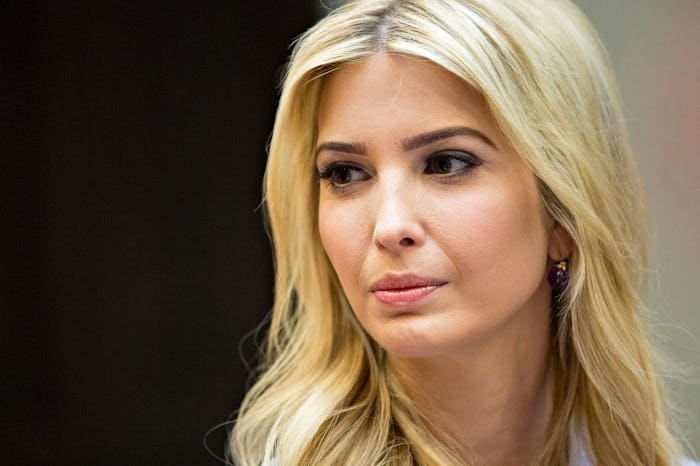News

Will Ivanka Trump Help Pass A Paid Leave Law?
The rise of Ivanka Trump to her new role as an adviser to President Donald Trump, her father, immediately raised concerns among the public. So, the White House sought to mitigate the national queasiness about suspected nepotism by announcing that she would not be paid. Trump critics may not be totally convinced, so they're watching what issues she'll ultimately take on and what she'll do. And because Ivanka has sought to brand herself as an advocate for women, all eyes are on her ability to make the workplace more equitable for them. She established herself as a voice on the matter during the campaign, but will Ivanka Trump actually pass an paid leave law?
Way back in September, when much of the country was convinced that Democrat Hillary Clinton would triumph over her Republican opponent, Trump announced a child care plan that would offer some women paid maternity leave. Reportedly heavily influenced by Ivanka, it called for employers to offer six weeks of paid maternity leave to mothers, as well as the implementation of tax credits to help pay for child care.
The maternity leave provision was several steps up from the United States' current federally mandated parental leave policy, because — cue the boos — there isn't one.
Under the Family and Medical Leave Act, full-time workers are entitled to time off when they have a child, but it does not have to be paid, according to Quartz. That's obviously a huge burden for many, many families. In fact, the U.S. Department of Labor reports that only 12 percent of employees in this country have access to paid family leave through their jobs. Improving this stat — which is straight-up dismal compared to the rest of the industrialized world — has been an aim of some Democratic lawmakers and others pushing for women's rights at work. To have a person who is actively thinking about these issues also holding the president's ear and his esteem seems like a step in the right direction.
Except Ivanka's relationship to this issue is flawed at best. Detractors of the child care policy she worked on criticized it because it left out fathers completely and favored wealthy families with its child care tax credits. Around that same time, a former high-level employee of Ivanka's brand claimed in a Facebook post that she was not offered paid maternity leave in her position working for the now-first daughter. (In a statement to Romper, a brand spokesperson dismissed the accusation as a "mischaracterization.")
Ivanka is one of her father's most effective surrogates. As a result, Trump critics are suspicious of her true intentions and motivations; Some are unconvinced she's truly dedicated to actually changing policy to help families.
Post-election, Ivanka met with lawmakers to discuss making the child care policy more inclusive offering leave to fathers, as well, which seems like a true response to the criticism. At the same time, her book, Women Who Work: Rewriting the Rules for Success, will be released in May, illustrating just how integral Ivanka's own form of feminism (and thus publicly talking about issues like parental leave) is to her own personal and professional brand.
So, the question of what Ivanka will actually do to pass legislation remains. As the daughter of a Republican president who famously said that pregnancy is inconvenient for business, she'll certainly face all the challenges any true politician would.